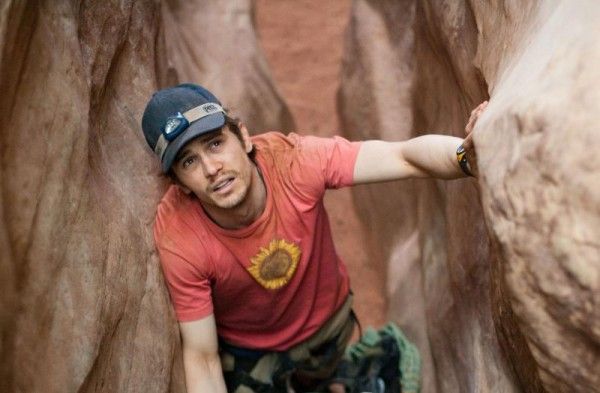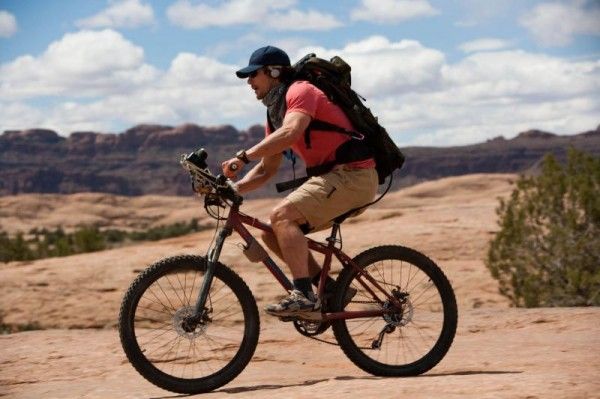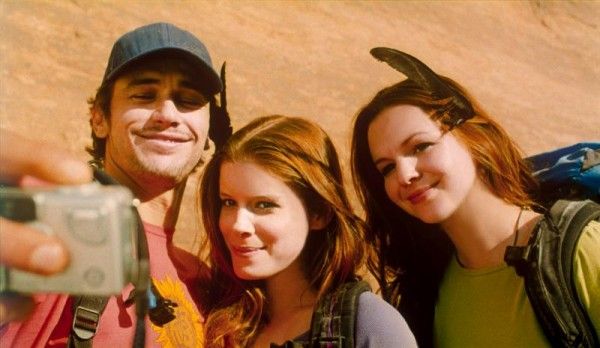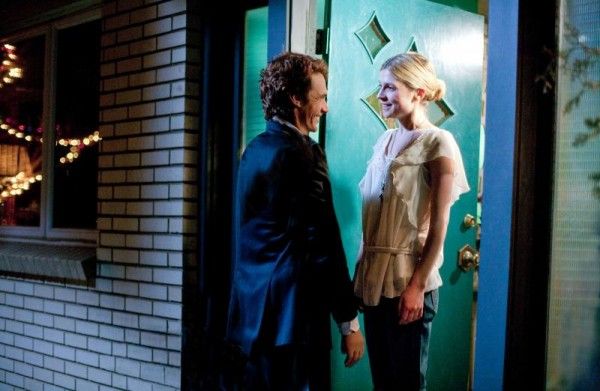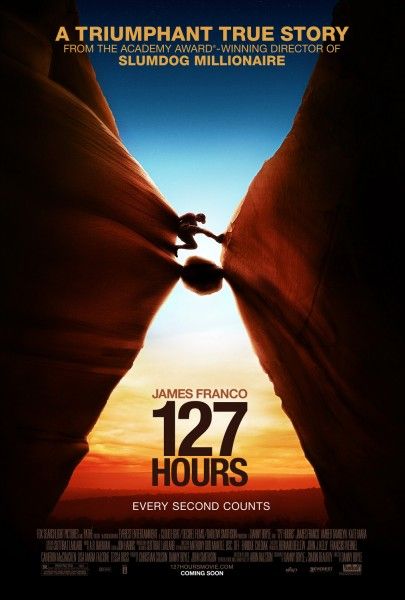Academy Award winning director Danny Boyle’s new film, 127 Hours, is a gripping account of mountain climber Aron Ralston’s harrowing ordeal after he becomes pinned under a boulder while canyoneering alone near Moab, Utah and must take desperate measures in order to survive. The film, co-written by Boyle and Simon Beaufoy, who won an Academy Award for Best Adapted Screenplay for Slumdog Millionaire, is inspired by Ralston’s memoir, “Between a Rock and a Hard Place,” and features a compelling, Oscar worthy performance by James Franco.
We sat down recently with Simon at a roundtable interview to talk about his collaboration with Danny Boyle. He told us how they set about finding the cinematic potential of a story involving one location and one actor and mined the anti-superhero aspects to reveal the spiritual journey Aron embarks on when he is pushed to the limits of human endurance. Simon also updated us on his upcoming film, Salmon Fishing in Yemen, directed by Lasse Halstrom from his screenplay.
Where did you first see the cinematic possibilities for what’s really a one set piece?
SIMON BEAUFOY: This story had been knocking around Danny’s head for a long time. I knew the story the minute it happened because I’m a climber and mountaineer. It was just on my radar immediately, but it never occurred to me, which I said to Danny. Of all the mountaineer stories at the time – I can give you ten to turn into films – this isn’t one of them for all the obvious reasons. It’s one guy. He doesn’t move. It’s the least cinematic experience imaginable. It’s impossible. And, of course, the minute you say impossible to Danny, he goes “I know, it’s impossible! Right!” So he did a draft that was really from a director’s point of view -- every angle and shot and precisely how he envisaged it, because he couldn’t really explain how it was going to work. He knew it in his head. Anyway, so we got it down on paper and it immediately became apparent that it was possible to do because it had so much energy. And that was the last thing you’d expect from this story is energy.
It’s interesting your first instinct was that it wasn’t cinematic. Aren’t there great examples of confined, solitary movies?
BEAUFOY: Tell me them.
Off the top of my head, Cast Away might be one of them. And I’m sure it goes back further than that.
BEAUFOY: There was Cast Away but that didn’t seem to be an example to go to somehow. What really fascinated me about this story was not the survival nature of it but the layers of it. The minute the story happened I thought it’s interesting that he’d been down there 3 days before anyone even noticed he was missing. And it was those aspects of the story, the kind of anti-superhero story, if you like. Cinema is full of superhero stories. I thought it was very interesting to make an anti-superhero story. He goes in a superhero. He goes in as Mr. Invincible, very self-centered really, and comes out changed and realizing that he’s just a part of the human race. He can’t do that with other people in a way that he thought he could. It was that almost spiritual side to the story, I guess, that really fascinated me and that Aron allowed us to tell. When I went to meet him, I had really long discussions about how just as a survival story it wasn’t going to connect with people. It’s like wow, it’s an amazing tale. You did an amazing thing. But there was a greater truth behind all this to tell if he would let us, which meant allowing us to tell some fairly unpretty things about him and his life as it was when he was 26.
Were there dreams and flashbacks in his book or was that from your research?
BEAUFOY: No, there were some memories of [past events]. The book alternates chapters between him being stuck in the canyon and past events. It’s kind of an autobiography really, but they weren’t specific to how he was treating people and treating life at the time. No. They came from conversations that we had.
Did you go to the actual place where this happened?
BEAUFOY: Oh yeah. Always. That’s where I start with the writing. I always start with the real people and the real place if you can. It’s a very lonely spot. Interestingly, the boulder which is still there is rather disappointing. It’s only this big. It’s just another rather scrappy boulder. There are lots of better, more cinematic boulders in that particular crack. But there it sits this little thing that caused all this trouble.
Is the hand still there?
BEAUFOY: No. The rangers came back a couple days later and lifted the boulder off it and then cremated the hand and gave Aron back the ashes which he scattered on the spot.
So the boulder’s not there anymore?
BEAUFOY: No, no. The boulder is there. They just lifted it off enough to get the hand out and then dropped it back.
How did they lift it?
BEAUFOY: Gee, I don’t know. Well I imagine with ropes and enough of them. Because that’s what’s bizarre, it’s not that big but it is too big for one guy to move. That’s for sure.
Did the cast and crew go there together to see it?
BEAUFOY: They did a trip to begin with, with Aron. I went down with a guide later. But yeah, we all went down there. They shot on location right exactly there.
As a mountaineer yourself, would you put yourself in a position like that and be as reckless as Aron was at the time running out to a spot like that alone?
BEAUFOY: I probably wouldn’t now but I might have done it when I was 26. The climbers are on a fairly strange journey, the good ones. It’s kind of a self-challenging, rather egotistical pursuit really. And the better they are, the closer to the edge they’re treading. There are two different types of people – the ones who go to the edge of the precipice and step back and go “Woohoo! I won’t do that again. I got away with it.” And then, there are the other ones who go “That’s good. Let’s see if I can tread a bit further towards the edge.” And he was on that path. We talked a lot about it. Now I wrote the lines and Aron saw every draft of the script. I realized there that this bug has been waiting for me all of my life. I’ve been heading towards it all of my life. And he read that and he went “That’s how I feel. That’s exactly how I feel. I was somehow asking for some ultimate challenge in some weird, subconscious way.” And he sure got it.
How much input did Aron have into the script?
BEAUFOY: He read every draft and commented extensively some of which we took on board and some of which we just couldn’t because drama is a different thing to actuality, and we talked a lot about the difference – whether you’re telling the fact or whether you’re aiming for a greater truth than fiction, if it works, that you can get to. But yeah, he read and commented on absolutely everything. And we tried to accommodate as much as possible. I don’t think there’s anything in there that he’s unhappy with. I don’t think there’s a frame in there that he’s unhappy with. But we had to explain precisely why if there was something we couldn’t do, we had to and quite rightly so. We had to explain why that wouldn’t work for us. It was the defining moment of his life. He has every right to question everything we did. Because when you fictionalize something, to allow that to happen, if you’re not careful, you’re letting go of the truth.
Have you ever been in a situation either mirroring Aron’s or some other kind of crisis where you thought I might not live through the rest of this day?
BEAUFOY: Yes, oh yes. Climbing. Been there. A rock fall in particular. I got these stones whizzing down from out of the sky. And you just think “Well, that one went two feet that way. That one went two feet the other way.” You can’t dodge them. They’re going way too fast and they make this terrible noise. It’s a buzzing noise. There’s the smell of cordite as they hit things on the way down. And you just think “I’m in the hands of God or destiny or whatever because I can’t dodge these. If one is going to hit me on the head, it’s going to hit me on the head and there’s nothing I can do about it. Yeah, I’ve been in electric storms in the mountains. Scary things. Yeah.
How did that help you connect?
BEAUFOY: Well we really did connect on that level because Danny and Christian (Colson), they’re urban boys. They don’t like their bass side at all. I think Aron felt very reassured that I climbed and that I understood him on that level. Although it was kind of a reckless thing to do, I didn’t judge him. A lot of people judge him, but he still goes out canyoning and climbing stuff. I completely understand that that’s part of who he is.
It can’t happen twice. Then again, there’s also a sequel.
BEAUFOY: (laughs) Well I supposed there’s that. He wouldn’t be able to get a knife in his prosthetic to chop the other one off.
When I was watching this movie, people in the audience had an incredibly vocal, visceral reaction and the biggest reaction came when he dropped the water, more even than when he cut his hand off.
BEAUFOY: That’s interesting. I have been in a lot of screenings but that hasn’t happened.
When you were writing, because you don’t have interaction to create emotional high points, how did you plot out where the moments would be?
BEAUFOY: It’s small things. It’s one of those instincts. In your Hollywood three-act drama here, you have a template that you have to adhere to which is the real facts. He was down there 127 hours. He had these things in his rock sack. He tried this on Day 1, he tried this on Day 2, and we really wanted to stick to that. As much as possible, we wanted to stick to what he did. So, you have to create your own little movements and emotional peaks and troughs and try and keep things moving forward. And bizarrely, the emotional movement forward of the script comes through the past which is a very unusual way of structuring something. But it’s this accumulation of bits of the past and the fact that, like him, his world boiled down to this tiny little area and the limitations of that world became extremely magnified to him. So a raven coming overhead at the same time was hugely significant to him. Or ants were very significant. The tiniest things – the drop of a knife becomes his whole world. So, instead of trying to avoid the limitations of this world, we try to amplify them really so they become huge events.
After collaborating with Danny, how does that affect the way you approach writing a script?
BEAUFOY: It just makes me much bolder, I suppose. We’re both very fond of going to the outrageous place really. What I’ve very much learned from Danny is the bold decisions generally work very well in cinema. It’s like the talk show host. That script came out of just deciding that once you’d reached despair, there was no place to go except humor really. So you do something that’s a little bit outrageous.
Was that just an invention? Did he actually play that game?
BEAUFOY: He didn’t play that game but he was hallucinating at the time. He was hallucinating about all the people waking up all over America and brushing their teeth. God, he was dying for that ordinary moment of waking up where he’d go “Oh, it’s another day.” It sort of spun out of that the need for him to reach some understanding out of the despair he’d just been in and I thought humor was a really good way of doing that because it’s kind of a coping mechanism.
Now I know James got to see a portion of the tapes which was essentially the last will and testament. Did you all get to?
BEAUFOY: Yeah, we all did. It was very interesting. They were a very helpful guide. A lot of what he says is verbatim from the original tapes. But what I took most away from them is the dignity and composure of them. I would have been a complete mess if I had been leaving messages to my family. But he was very dignified. It was very important to him not to lose control because this was his last will and testament. This was the last time as far as he was concerned his mom were to see him and he didn’t want her to realize how much emotional pain he was in. So they’re very composed and they’re strangely moving because of that, because of the restraint, I guess.
In what ways did James surprise you as you saw the performance he was giving in this movie?
BEAUFOY: It’s beautifully nuanced. He can move very fleetingly through different types of emotion. I love that. And it’s also his commitment. It feels like a totally committed performance. There’s no sense that he’s copying Aron. There’s a sense that he’s absolutely inhabiting that particular journey himself which he was. They made a decision early on not to try and be Aron but be James in the canyon and go through it himself and filter it all through him.
In that same way, because Aron saw every draft and had so much input, once you’re on set and you just have to live the experience, how much did the script change and were there any major moments that stick out that shifted once you had the cameras rolling?
BEAUFOY: No, there were no major moments actually. No. It was such an odd piece that you need to stick to what you’ve worked out on the page really because it’s just an odd beast as a script and as a film. It’s very close to the script. Often James would say “I don’t need to say this” which was a bit troubling to me given that there’s hardly any dialogue in it. We’re scratching out lines of dialogue here. Is there going to be any left? I always thought it was wonderful that he just knew he could do it without the chat.
What is it that you hope the audience will take away after seeing this experience unfold?
BEAUFOY: I think they’d all better ring their mothers. There was no signal for cell phone out there. Well it’s about connecting with people and reconnecting and just understanding that we can’t really live without each other and it’s those connections that perhaps are more important than one realizes, I think, and that you should seize them and take advantage of them while you can. Everyone’s got a boulder in their life of one sort or another that they need to overcome. For most people, it’s not a literal one, but there are certainly metaphorical ones. It’s about how it’s actually people that get you through on the whole, I think. At least that’s the message that filtered through Aron, me and Danny. That’s what we believe and wanted to say.
Who’s idea was “Lovely Day”? It’s perfect.
BEAUFOY: That was Jon Harris, the editor’s, I think. Yeah, I’m pretty sure that was him. It’s good, isn’t it? It’s very funny. I mean in a horrific way.
What are you working on next?
BEAUFOY: There’s a film called Salmon Fishing in the Yemen which I just finished shooting about 3 weeks ago with Lasse Hallstrom directing. So, I’ll be in the cutting room with that. And then, Danny, Christian and I will be cooking up something else for when Danny comes back from the Olympics if he ever survives that.
What’s it like going from Danny to Lasse Hallstrom, two very different directors?
BEAUFOY: Yeah, just very different approaches. They’re both very good directors but it’s a very special relationship that Christian, Danny and I have which I’ve never had with another writer/director/producer. It’s very valuable really.
127 Hours opens in theaters on November 5th.

